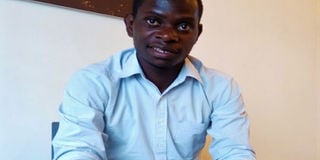BY THE BOOK: Sanya Noel

Sanya Noel, who works as a mechatronics engineer and doubles up as an editor at Enkare Review, Nairobi. PHOTO | COURTESY
What you need to know:
- Many young writers have not really seen what the writing process involves. They need nurturing.
- I’ve read Yemisi Aribisala’s Longthroat Memoirs. It’s the kind of book that walks into a bar whistling and attracts the attention.
- Prizes can derail you. Tenessee Williams wrote about a similar thing in The Catastrophe of Success. Writers shouldn’t pay too much attention to them.
Sanya Noel is an editor at Enkare Review, a literary magazine in Nairobi.
He is a mechatronics engineer but prefers to spend most of his time writing poetry, fiction, and non-fiction. His work has been published in Kwani? Omenana,Enkare Review, and Lawino Magazine. Last year, Sanya was one of the winners feted at the Babishai Niwe Poetry Awards.
He spoke to Nation.co.ke about his literary favourites and fantasies.
Do you consider yourself an African writer?
Yes. I live on and write from the continent, and that qualifies me as one. In terms of what I’m expected to write as an African writer however, I forget the label and just write what I want to.
Which two books do you hold so dear that they can’t possibly be lent out?
Marjorie Oludhe Macgoye’s The Composition of Poetry. I found this book at a very early point in my writing life and learnt so much from it, especially on matters of form. I still use it.
The second one is Strunk and White’s Elements of Style. This is very essential to me as an editor. Writing is a religion, and Strunk and White’s Elements its bible. Every young writer needs this book.
As an editor of a contemporary literary journal, what is your take on works of contemporary Kenyan writers?
It’s an interesting time, that’s for sure, but we need more. We have writers who have it in them. The poetry is very interesting and experimental, the fiction accurately depicting our society, and the non-fiction giving us an exact sense of where we are, but many of these young writers have not really seen what the writing process involves. They need nurturing. Publishers can step up and bring these books to the labour room.
I’d also like to see more writers who actually care about the craft. Writers must obsess about words and sentences. We don’t have a lot of that in mainstream, though it’s an everyday thing in the little-known journals.
What are your favourite 2017 readsand why?
I’ve read Yemisi Aribisala’s Longthroat Memoirs. It’s the kind of book that walks into a bar whistling and attracts the attention of everyone in the room.
Then it sits down, orders for a whiskey, neat, takes a swig, orders for a second one, takes a swig, asks the barman what the news is around town, gets told of the cows that got shot down by the police, pays, and walks out without bothering to acknowledge the other drinkers in the bar. It’s a rebellious book with a lot of guts. I love that.
I’ve also read John McPhee’s Uncommon Carriers and The Pine Barrens. McPhee’s attention to detail is amazing, but these are old books. Do they qualify as 2017 reads?
Your childhood favourite books?
Mashimo ya Mfalme Suleimani and Shamba la Wanyama. I didn’t grow up with many books around me, but I had aunts who were in secondary school then and they read the latter as a class text. I loved it. It really got my imagination going. To this day, I’ve never read its English version; Animal Farm just sits there on my shelf. (Is that a bad thing to admit?)
If you were to dine with three writers, dead or alive, who would they be and why?
Poet Nikki Giovanni would be first. When I started writing, my uncle bought me the Collected Poetry of Nikki Giovanni. I would read it, even during exams period in university. She has this poem titled Paint Me Like I Am where she writes:
I think humans are not the only thinking beings
we just happen to be the only species
that we respect.
I loved that. The second person would be poet Anna Akhmatova. Talking to her would calm me down, and it would give me an idea on how to navigate around totalitarian regimes. The third one would be Charles Bukowski. How did he manage to write such bad but alive poetry for so long without getting bored of it?
Do you think book festivals and writing workshops are important fora writer’s growth?
Yes they are, especially on networks. Festivals and workshops introduce you to communities, and I think that’s important. I’m more of a lone ranger though, but I still recognise how important they are to many writers.
In your opinion, are literary prizes important?
Yes, the money is important. It gives you some space and time to write, if it’s enough. But prizes can derail, too. Tenessee Williams wrote about a similar thing in The Catastrophe of Success. Writers shouldn’t pay too much attention to them.
What are you currently reading?
David Remnick’s King of the World. It’s a book on Muhammad Ali. I recommend it to anyone who loves good writing. Also, Wislawa Szymborka’s collected poems and Mary Jo Bang’s A Doll for Throwing. Her’s is poetry too. I’m always reading poetry.
Do you think book reviews are necessary in Kenya?
Yes, they are. We need very comprehensive reviews, and not just for books. We also have theatre, film, and music. I would like to see a review where a writer talks about Juliani’s music in comparison to, say, 18 Hours, the movie, and how there is a connection. Art doesn’t exist alone, it exists in a continuum. Reviews should bring this out. Reviews also market the books and artworks. We need that.





